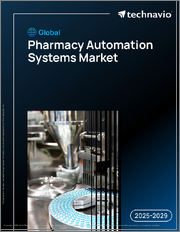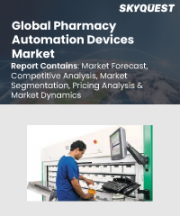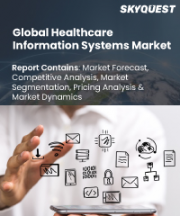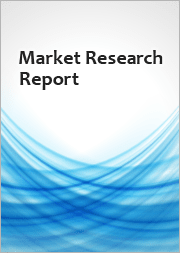
|
시장보고서
상품코드
1806541
약국 자동화 시스템 시장 : 제품 유형, 기술, 자동화 레벨, 전개 유형, 최종사용자별 - 세계 예측(2025-2030년)Pharmacy Automation System Market by Product Type, Technology, Automation Level, Deployment Type, End User - Global Forecast 2025-2030 |
||||||
약국 자동화 시스템 시장은 2024년에 62억 4,000만 달러로 평가되었습니다. 2025년에는 67억 3,000만 달러에 이르고, CAGR 8.17%로 성장하여 2030년에는 100억 달러에 달할 것으로 예측됩니다.
| 주요 시장 통계 | |
|---|---|
| 기준 연도 : 2024년 | 62억 4,000만 달러 |
| 추정 연도 : 2025년 | 67억 3,000만 달러 |
| 예측 연도 : 2030년 | 100억 달러 |
| CAGR(%) | 8.17% |
지능형 투약 관리의 무대 설정: 약국 자동화 시스템의 혁신을 통해 의료를 고정밀, 고효율의 새로운 시대로 이끌다.
지난 10년간 의료 서비스 제공업체가 환자 안전 향상과 비용 절감이라는 두 가지 과제를 해결하기 위해 노력하면서 약국 업무는 급속한 디지털 전환을 겪었습니다. 자동 조제 캐비닛은 현재 전자 의료 기록과 원활하게 통합되어 수작업으로 인한 핸드오프를 줄이고, 기록 오류를 거의 없애고 있습니다. 이와 동시에, 고급 포장 및 조제 시스템은 초보적인 기계화 워크플로우에서 실시간 재고 가시성 및 예측 보충을 지원하는 완전 네트워크화된 플랫폼으로 발전하고 있습니다.
패러다임의 변화: 신기술, 규제 개혁, 환자 중심 모델이 약국 자동화 환경을 재정의하는 방법
약국 자동화는 더 이상 단순한 인력 대체가 아닌, 정확성과 민첩성이 요구되는 환자 중심 케어 모델을 전략적으로 실현하는 것이 되고 있습니다. 인공지능 알고리즘이 조제 캐비닛과 조제 시스템에 내장되어 수요 예측, 이상 감지, 투약량 결정의 지침이 되고 있습니다. 동시에 사물인터넷 센서를 통해 온도와 습도를 세밀하게 모니터링하여 공급망 전체에 걸쳐 의약품의 무결성을 보장합니다.
2025년 미국의 새로운 관세 조치가 제약 자동화 공급망과 산업 비용 구조에 미치는 광범위한 영향에 대해 알아봅니다.
제약 장비 수입 부품에 대한 미국의 추가 관세 도입으로 세계 공급망 취약성에 대한 감시의 눈초리가 더욱 엄격해지고 있습니다. 그동안 저비용 지역에서 중요한 서브시스템을 조달하던 제조업체들은 현재 상륙 비용의 상승과 리드타임의 장기화에 직면해 있습니다. 이러한 움직임 속에서 거래처 상표 제품 제조업체는 조달 전략을 재검토하고, 공급업체 다변화를 우선시하며, 치솟는 관세로부터 생산을 보호하기 위해 니어쇼어링의 기회를 모색해야 할 필요가 있습니다.
다면적인 세분화 인사이트 활용으로 약국 자동화 전반의 제품 혁신, 시장 침투 전략, 니즈에 맞는 서비스 제공 촉진
세밀한 세분화 분석을 통해 자동 조제 캐비닛에서 정맥 내 혼합 솔루션에 이르기까지 제품 유형의 차이가 벤더의 로드맵과 공급자의 투자에 영향을 미치고 있음을 알 수 있었습니다. 분주 캐비닛의 경우, 바닥형 유닛은 사용량이 많은 병원 복도에서 선호도가 높은 반면, 벽걸이형은 공간 제약이 있는 외래 진료소에서 선호되고 있습니다. 자동 포장 시스템은 단위 용량 포장이 가능한 하이스루풋 로봇 라인으로 진화하고 있으며, 정맥 내 혼합 플랫폼은 폐쇄 순환식 무균 워크플로우와 자동 배합 스테이션으로 구분되어 오염 위험을 줄이기 위해 자동화가 진행되고 있습니다. 한편, 정제 카운터는 고속형과 표준형으로 나뉘며, 고속형은 대량 조제를 위해 대형 소매 약국에서 채택하고, 표준형은 처리량이 적은 소규모 클리닉을 지원합니다.
지역 시장 역학을 활용하여 성장 기회를 파악하고, 운영의 편차를 해소하며, 다양한 지역에서 환자 치료 결과를 개선할 수 있습니다.
북미와 남미를 분석하면, 탄탄한 상환 프레임워크와 엄격한 환자 안전 의무에 힘입어 첨단 조제 캐비닛과 통합 분석 플랫폼의 도입이 성숙해졌음을 알 수 있습니다. 이 지역에서는 공급업체들이 설치 및 변경 관리 모범 사례를 개선하는 한편, 공급망 경영진은 인플레이션 압력과 관세의 영향을 상쇄하기 위해 수량 기준 가격 협상을 진행하고 있습니다.
약국 자동화 분야의 전략적 제휴, 기술 혁신, 경쟁적 포지셔닝을 평가하기 위한 업계 리더 및 선구적 혁신가 프로파일링
주요 자동화 공급업체들은 소프트웨어 공급업체 및 컨설팅 회사와 파트너십을 맺고 설치, 교육, 지속적인 최적화를 포함한 엔드투엔드 솔루션을 제공합니다. 이러한 제휴는 조제 하드웨어와 기업 자원 계획 시스템을 연결하는 상호 운용 가능한 미들웨어를 중심으로 이뤄지는 경우가 많습니다. 동시에, 선견지명이 있는 스타트업들은 AI 기반 품질 보증 모듈과 시설 전반의 성능 데이터로 훈련된 머신러닝 모델을 활용한 예지보전 서비스를 도입하여 기존 기업들에게 도전하고 있습니다.
약국 자동화의 운영 우수성을 강화하고, 위험을 줄이며, 지속 가능한 성장을 가속하기 위해 업계 리더를 위한 실행 가능한 권장 사항 제공
첫째, 조직은 중앙 집중식 성능 대시보드와 자동화된 컴플라이언스 보고서를 제공하는 클라우드 지원 자동화 플랫폼의 도입을 가속화해야 합니다. 이러한 변화는 유지보수 주기를 간소화하고, IT팀과 약국 운영팀 모두에게 실시간 통찰력을 제공합니다. 둘째, 전문 부품 공급업체 및 데이터 분석 제공업체와 전략적 제휴를 맺어 공급망 혼란을 완화하는 동시에 고도의 예측 유지보수 능력을 끌어낼 수 있습니다.
면밀한 정성적 인터뷰, 체계적인 2차 조사, 엄격한 데이터 검증 절차에 따른 엄격한 혼합법적 조사 접근법 개요
당사의 조사 방법은 1차 조사와 2차 조사를 통합하여 확실하고 종합적인 분석을 실현하고 있습니다. 먼저, 학술 문헌, 규제 당국 제출 서류, 업계 백서를 철저히 검토하여 기초 지식을 확립하고, 진화하는 표준과 기술 맥락을 파악했습니다. 2차 조사 단계에서는 공급망 궤적을 그리기 위해 특허 환경과 전 세계 무역 데이터 평가도 함께 진행했습니다.
약국 자동화의 미래에 대한 결론적 관점: 차세대 약물 관리를 형성하는 전략적 과제와 새로운 트렌드의 통합
우리의 분석을 종합하면, 약국 자동화는 기술 혁신, 규제 진화, 케어 모델 전환의 교차점에 있다는 것이 분명합니다. AI를 활용한 품질 보증, 모듈화된 하드웨어 설계, 클라우드 네이티브 플랫폼의 통합은 앞으로도 효율성을 높이고 환자의 안전을 강화할 것으로 보입니다. 이해관계자들은 유연한 아키텍처와 다양한 공급 채널을 채택하여 관세로 인한 비용 압박과 진화하는 컴플라이언스 표준에 대한 경계를 늦추지 않아야 합니다.
목차
제1장 서문
제2장 조사 방법
제3장 주요 요약
제4장 시장 개요
제5장 시장 역학
제6장 시장 인사이트
- Porter's Five Forces 분석
- PESTEL 분석
제7장 미국 관세의 누적 영향 2025
제8장 약국 자동화 시스템 시장 : 제품 유형별
- 자동 조제 캐비닛
- Floor-standing
- 벽걸이식
- 자동 포장 시스템
- IV 혼합 시스템
- 자동 조제
- 폐회로
- 정제 카운터
- 고속 카운터
- 표준 카운터
제9장 약국 자동화 시스템 시장 : 기술별
- 바코드 검증
- 전기 기계
- 시각 검사
제10장 약국 자동화 시스템 시장 : 자동화 레벨별
- 완전 자동 시스템
- 반자동 시스템
제11장 약국 자동화 시스템 시장 : 전개 유형별
- 클라우드 기반 전개
- On-Premise 전개
제12장 약국 자동화 시스템 시장 : 최종사용자별
- 클리닉
- 병원 약국
- 장기 케어
- 간병 주택
- 요양시설
- 소매 약국
제13장 아메리카의 약국 자동화 시스템 시장
- 미국
- 캐나다
- 멕시코
- 브라질
- 아르헨티나
제14장 유럽, 중동 및 아프리카의 약국 자동화 시스템 시장
- 영국
- 독일
- 프랑스
- 러시아
- 이탈리아
- 스페인
- 아랍에미리트(UAE)
- 사우디아라비아
- 남아프리카공화국
- 덴마크
- 네덜란드
- 카타르
- 핀란드
- 스웨덴
- 나이지리아
- 이집트
- 튀르키예
- 이스라엘
- 노르웨이
- 폴란드
- 스위스
제15장 아시아태평양의 약국 자동화 시스템 시장
- 중국
- 인도
- 일본
- 호주
- 한국
- 인도네시아
- 태국
- 필리핀
- 말레이시아
- 싱가포르
- 베트남
- 대만
제16장 경쟁 구도
- 시장 점유율 분석, 2024
- FPNV 포지셔닝 매트릭스, 2024
- 경쟁 분석
- Allscripts Healthcare Solutions, Inc. by Constellation Software Inc
- AmerisourceBergen Corporation
- Apex Pharmacy Automation, Inc.
- ARxIUM Healthcare Solutions, Inc.
- Baxter International Inc.
- Becton, Dickinson and Company
- Capsa Solutions, LLC.
- Cardinal Health, Inc.
- CompuGroup Medical SE & Co. KGaA
- Computer-Rx, Inc.
- CVS Health Corporation
- Epic Systems Corporation
- Infinity Pharmacy Systems, Inc.
- Liberty Software Systems, Inc.
- McKesson Corporation
- MedAvail Technologies Corporation
- Medical Information Technology, Inc.
- Medline Industries, Inc.
- NextGen Healthcare, Inc.
- Omnicell, Inc.
- QS/1, Inc.
- RedSail Technologies, LLC
- Rite Aid Corporation
- Swisslog Healthcare AG
- TouchPoint, Inc.
제17장 리서치 AI
제18장 리서치 통계
제19장 리서치 컨택트
제20장 리서치 기사
제21장 부록
LSH 25.09.17The Pharmacy Automation System Market was valued at USD 6.24 billion in 2024 and is projected to grow to USD 6.73 billion in 2025, with a CAGR of 8.17%, reaching USD 10.00 billion by 2030.
| KEY MARKET STATISTICS | |
|---|---|
| Base Year [2024] | USD 6.24 billion |
| Estimated Year [2025] | USD 6.73 billion |
| Forecast Year [2030] | USD 10.00 billion |
| CAGR (%) | 8.17% |
Setting the Stage for Intelligent Medication Management: Unveiling Transformations in Pharmacy Automation Systems Driving Healthcare Delivery into a New Era of Precision & Efficiency
Over the past decade, pharmacy operations have undergone rapid digital transformation as healthcare providers grapple with the dual imperatives of improving patient safety and controlling costs. Automated dispensing cabinets now seamlessly integrate with electronic health records, reducing manual handoffs and virtually eliminating transcription errors. In parallel, systems for packaging and compounding have advanced from rudimentary mechanized workflows to fully networked platforms that support real-time inventory visibility and predictive restocking.
This introductory overview explores how demographic pressures and heightened regulatory requirements are converging to accelerate the adoption of automation. An aging population with increasingly complex medication regimens is placing unprecedented demands on pharmacists, while authorities worldwide are tightening standards to prevent adverse drug events. Against this backdrop, market participants are leaning into robotics, machine vision, and cloud-based analytics to deliver scalable solutions that enhance throughput, streamline compliance, and free clinical staff to focus on patient care.
As we embark on this executive summary, we will trace the major drivers reshaping the pharmacy automation landscape, highlight transformative technologies, and outline the strategic considerations that will define competitive winners. The following sections build upon this foundation to examine segmentation insights, regional dynamics, tariff impacts, company strategies, research methodology, and actionable recommendations for forward-thinking organizations.
Navigating the Paradigm Shift: How Emerging Technologies, Regulatory Reforms, and Patient-Centric Models Are Redefining the Pharmacy Automation Landscape
Pharmacy automation is no longer simply about labor substitution; it has become a strategic enabler of patient-centric care models that demand both precision and agility. Artificial intelligence algorithms are being embedded in dispensing cabinets and compounding systems to forecast demand, flag anomalies, and guide dosage decisions. Concurrently, Internet of Things sensors are delivering granular temperature and humidity monitoring to ensure drug integrity throughout the supply chain.
Regulatory bodies are responding by updating guidelines to accommodate digital record-keeping, remote auditing, and interoperability standards. In many regions, authorities now require end-to-end traceability for high-risk medications and mandate barcode verification at every transfer point. These reforms are pushing providers to upgrade legacy electromechanical systems in favor of vision inspection and software-driven automation that can generate immutable audit trails.
Furthermore, a shift toward value-based care is compelling hospital and clinic networks to demonstrate outcomes tied to medication adherence and error reduction. Automation platforms that integrate with telehealth and patient engagement tools are emerging to close the loop between prescriber, pharmacist, and end user. As consolidation continues among health systems, interoperability and scalable architecture will be essential to manage cross-facility workflows and maintain compliance at scale. This section unpacks these transformative shifts and sets the stage for a deeper dive into tariff impacts and segmentation strategies.
Unraveling the Far-Reaching Consequences of New US Tariff Measures on Pharmaceutical Automation Supply Chains and Industry Cost Structures in 2025
The introduction of additional United States tariffs on imported components for pharmaceutical equipment has heightened scrutiny of global supply chain vulnerabilities. Manufacturers that previously sourced critical subsystems from low-cost regions are now facing increased landed costs and lengthier lead times. This dynamic has compelled original equipment manufacturers to reassess their procurement strategies, prioritize supplier diversification, and explore near-shoring opportunities to shield production from escalating duties.
Beyond direct cost inflation, the tariff measures have triggered ripple effects in component availability and vendor consolidation. Some specialized actuator and sensor providers have paused exports altogether, forcing automation suppliers to certify alternative parts or redesign modules to maintain compliance with harmonized codes. In turn, end-user organizations are experiencing project delays and budget overruns, which are prompting a renewed focus on total cost of ownership and phased implementation roadmaps.
To counteract these pressures, industry stakeholders are leveraging volume-leveraging negotiations, multi-tiered supplier agreements, and tariff engineering techniques. Additionally, forward-thinking firms are investing in modular architectures that permit incremental upgrades, thereby deferring capital expenditure spikes. This section details how the cumulative impact of 2025 tariffs is reshaping cost structures, supply chain resilience, and competitive positioning across the pharmacy automation domain.
Harnessing Multifaceted Segmentation Insights to Drive Product Innovation, Market Penetration Strategies, and Tailored Service Offerings Across Pharmacy Automation
A granular segmentation analysis reveals that product type distinctions-ranging from automated dispensing cabinets through to IV admixture solutions-are influencing both vendor roadmaps and provider investments. Within the dispensing cabinet category, floor-mounted units are gaining traction in high-volume hospital corridors, whereas wall-mounted iterations are preferred in space-constrained outpatient clinics. Automated packaging systems are evolving toward high-throughput robotic lines capable of unit-dose wrapping, while IV admixture platforms, segmented between closed-circuit sterile workflows and automated compounding stations, are increasingly automated to reduce contamination risk. Meanwhile, pill counters bifurcate into high-speed and standard formats, with high-speed counters being adopted by large retail pharmacies for bulk preparation and standard counters supporting smaller clinics with lower throughput.
Technology segmentation underscores barcode verification as a baseline requirement, but vision inspection and electromechanical sorting are ascending in importance for complex dosing regimens and biologic therapies. Organizations are assessing the tradeoffs between fully automated systems, which promise end-to-end process cohesion, versus semi-automated alternatives that facilitate incremental automation without disrupting existing workflows. Deployment preferences vary from cloud-based solutions that enable centralized monitoring and software updates to on-premise installations preferred by institutions with stringent data sovereignty and integration mandates.
End-user segmentation further amplifies these insights: hospital pharmacy operations are prioritizing high-capacity compounding platforms, whereas long-term care facilities such as assisted living communities and nursing homes seek modular dispensing systems to manage polypharmacy. Retail pharmacies are embracing speed and accuracy features, and clinics value compact cabinets with simplified user interfaces. By overlaying these dimensions, stakeholders can craft differentiated value propositions that resonate with each end-user scenario, optimize ROI, and accelerate adoption curves.
Leveraging Regional Market Dynamics to Identify Growth Opportunities, Address Operational Variances, and Enhance Patient Outcomes Across Diverse Geographies
Analysis of the Americas reveals mature adoption of advanced dispensing cabinets and integrated analytics platforms, driven by robust reimbursement frameworks and stringent patient safety mandates. Within this region, providers are refining best practices in installation and change management, while supply chain executives negotiate volume-based pricing to counteract inflationary pressures and tariff impacts.
In Europe, Middle East & Africa, regulatory harmonization efforts are leveling the playing field for emerging automation providers. Several national health authorities are piloting closed-circuit IV admixture certification programs, which is catalyzing modernization in hospital pharmacies. Stakeholders in this region balance cost containment with the demand for compliance with EU guidelines, leading to hybrid deployment models that combine local data hosting with cloud-based management.
Asia-Pacific exhibits the most pronounced growth trajectory, fueled by expanding healthcare infrastructure, rising pharmaceutical R&D hubs, and government initiatives to reduce medication errors. Countries such as Japan and Australia are early adopters of vision-based verification systems, while developing markets are prioritizing semi-automated pill counters and modular dispensing solutions to elevate safety standards with limited capital outlay.
By juxtaposing these regional nuances, organizations can calibrate market entry approaches, align technology investments with regulatory timelines, and customize service models to drive optimal clinical and financial outcomes across the globe.
Profiling Industry Leaders and Pioneering Innovators to Assess Strategic Alliances, Technological Breakthroughs, and Competitive Positioning in Pharmacy Automation
Leading automation suppliers have forged partnerships with software vendors and consulting firms to deliver end-to-end solutions that encompass installation, training, and ongoing optimization. These alliances often center around interoperable middleware that bridges dispensing hardware with enterprise resource planning systems. At the same time, visionary startups are challenging incumbents by introducing AI-driven quality-assurance modules and predictive maintenance services that leverage machine learning models trained on cross-facility performance data.
Acquisitions remain a core strategy for established players seeking to broaden their product portfolios and geographic footprint. Recent deals have targeted specialized electromechanical component manufacturers and cloud-native analytics platforms, enabling acquirers to integrate complementary capabilities and provide unified service agreements. In parallel, joint ventures between device makers and software integrators are driving the development of subscription-based service models that reduce upfront capital barriers and align vendor incentives with operational performance metrics.
Competitive positioning is now shaped by the ability to demonstrate outcomes such as reduced dispensing errors, improved inventory turns, and accelerated refill cycles. Vendors differentiate through proprietary machine vision algorithms, modular hardware architectures, and global service networks capable of 24/7 remote diagnostics. Emerging leaders are also exploring decentralized command centers and self-healing software stacks to minimize downtime and enhance user experience.
Actionable Recommendations for Industry Leaders to Enhance Operational Excellence, Mitigate Risk, and Foster Sustainable Growth in Pharmacy Automation
First, organizations should accelerate the adoption of cloud-enabled automation platforms that provide centralized performance dashboards and automated compliance reporting. This shift will streamline maintenance cycles and deliver real-time insights to both IT and pharmacy operations teams. Secondly, forging strategic alliances with specialty component suppliers and data analytics providers can mitigate supply chain disruptions while unlocking advanced predictive maintenance capabilities.
Next, leaders should invest in workforce training programs that align with new automation workflows and foster a culture of continuous improvement. By equipping pharmacists and technicians with digital literacy skills, institutions can maximize system utilization and reduce resistance to change. Concurrently, a phased implementation roadmap-starting with semi-automated modules and scaling to fully integrated solutions-will help manage capital expenditure and minimize operational risk.
Lastly, embedding robust risk-management protocols is essential. This includes defining clear processes for tariff-related cost fluctuations, establishing alternative sourcing strategies, and conducting periodic vulnerability assessments. By adopting these recommendations, industry decision-makers can build resilient, scalable automation infrastructures that drive quality, safety, and financial performance over the long term.
Outlining a Rigorous Mixed-Method Research Approach with In-Depth Qualitative Interviews, Systematic Secondary Research, and Stringent Data Validation Procedures
Our research methodology integrates primary and secondary approaches to ensure a robust and comprehensive analysis. Initially, an exhaustive review of academic literature, regulatory filings, and industry white papers established foundational knowledge and contextualized evolving standards and technologies. This secondary research phase also included an assessment of patent landscapes and global trade data to map supply chain trajectories.
Concurrently, we conducted in-depth interviews with C-level executives, pharmacy directors, and operations managers to capture firsthand perspectives on implementation challenges, ROI metrics, and unmet needs. These qualitative sessions were supplemented by thematic analyses to identify emerging patterns and validate hypothesis constructs.
Data triangulation was achieved through the corroboration of interview findings with vendor product specifications and public financial disclosures. Finally, a series of validation workshops brought together industry experts and end-users to stress-test preliminary insights, refine segmentation frameworks, and ensure that strategic recommendations are grounded in real-world operational realities. This mixed-method approach delivers both the breadth and depth necessary to guide high-stakes decision-making in pharmacy automation.
Concluding Perspectives on the Future of Pharmacy Automation: Synthesizing Strategic Imperatives and Emerging Trends Shaping Next-Generation Medication Management
In synthesizing our analysis, it is evident that pharmacy automation stands at the intersection of technological innovation, regulatory evolution, and shifting care models. The integration of AI-enabled quality assurance, modular hardware designs, and cloud-native platforms will continue to drive efficiency gains and elevate patient safety. Stakeholders must remain vigilant to tariff-induced cost pressures and evolving compliance standards by embracing flexible architectures and diversified supply channels.
Strategically, vendors and end-users alike will benefit from an ecosystem approach that prioritizes interoperability, data lineage, and outcome-based service agreements. Organizations that invest in workforce readiness and foster cross-functional collaboration between IT, clinical, and operational teams will secure the greatest returns on automation investments.
Looking ahead, the convergence of telepharmacy, robotics, and predictive analytics promises to reshape how medications are dispensed, monitored, and managed. The winners in this dynamic landscape will be those that can translate deep segmentation insights into tailored solutions, harness regional nuances to optimize deployment, and execute agile strategies that deliver both clinical excellence and financial resilience.
Table of Contents
1. Preface
- 1.1. Objectives of the Study
- 1.2. Market Segmentation & Coverage
- 1.3. Years Considered for the Study
- 1.4. Currency & Pricing
- 1.5. Language
- 1.6. Stakeholders
2. Research Methodology
- 2.1. Define: Research Objective
- 2.2. Determine: Research Design
- 2.3. Prepare: Research Instrument
- 2.4. Collect: Data Source
- 2.5. Analyze: Data Interpretation
- 2.6. Formulate: Data Verification
- 2.7. Publish: Research Report
- 2.8. Repeat: Report Update
3. Executive Summary
4. Market Overview
- 4.1. Introduction
- 4.2. Market Sizing & Forecasting
5. Market Dynamics
- 5.1. Expansion of battery-operated mobile robots for internal logistics and medication delivery within healthcare facilities
- 5.2. Incorporation of voice-activated order processing in pharmacy automation to enhance pharmacist efficiency
- 5.3. Integration of AI-driven medication dispensing to reduce errors and optimize workflows in pharmacies
- 5.4. Deployment of robotic prescription fulfillment systems to streamline high-volume drug distribution
- 5.5. Development of blockchain-based medication traceability to ensure supply chain transparency and security
- 5.6. Integration of automated compounding systems for sterile and non-sterile medication preparation in hospital pharmacies
- 5.7. Emergence of cloud-based pharmacy management platforms for centralized automation and compliance monitoring
- 5.8. Utilization of analytics-driven replenishment algorithms to minimize stockouts and overstock scenarios
- 5.9. Adoption of IoT-enabled smart cabinets for real-time inventory tracking and temperature monitoring
- 5.10. Implementation of telepharmacy services supported by automated dispensing cabinets for remote patient care
6. Market Insights
- 6.1. Porter's Five Forces Analysis
- 6.2. PESTLE Analysis
7. Cumulative Impact of United States Tariffs 2025
8. Pharmacy Automation System Market, by Product Type
- 8.1. Introduction
- 8.2. Automated Dispensing Cabinets
- 8.2.1. Floor Mounted
- 8.2.2. Wall Mounted
- 8.3. Automated Packaging Systems
- 8.4. IV Admixture Systems
- 8.4.1. Automated Compounding
- 8.4.2. Closed Circuit
- 8.5. Pill Counters
- 8.5.1. High-Speed Counters
- 8.5.2. Standard Counters
9. Pharmacy Automation System Market, by Technology
- 9.1. Introduction
- 9.2. Barcode Verification
- 9.3. Electromechanical
- 9.4. Vision Inspection
10. Pharmacy Automation System Market, by Automation Level
- 10.1. Introduction
- 10.2. Fully Automated Systems
- 10.3. Semi-Automated Systems
11. Pharmacy Automation System Market, by Deployment Type
- 11.1. Introduction
- 11.2. Cloud-Based Deployment
- 11.3. On-Premise Deployment
12. Pharmacy Automation System Market, by End User
- 12.1. Introduction
- 12.2. Clinics
- 12.3. Hospital Pharmacy
- 12.4. Long Term Care
- 12.4.1. Assisted Living
- 12.4.2. Nursing Homes
- 12.5. Retail Pharmacy
13. Americas Pharmacy Automation System Market
- 13.1. Introduction
- 13.2. United States
- 13.3. Canada
- 13.4. Mexico
- 13.5. Brazil
- 13.6. Argentina
14. Europe, Middle East & Africa Pharmacy Automation System Market
- 14.1. Introduction
- 14.2. United Kingdom
- 14.3. Germany
- 14.4. France
- 14.5. Russia
- 14.6. Italy
- 14.7. Spain
- 14.8. United Arab Emirates
- 14.9. Saudi Arabia
- 14.10. South Africa
- 14.11. Denmark
- 14.12. Netherlands
- 14.13. Qatar
- 14.14. Finland
- 14.15. Sweden
- 14.16. Nigeria
- 14.17. Egypt
- 14.18. Turkey
- 14.19. Israel
- 14.20. Norway
- 14.21. Poland
- 14.22. Switzerland
15. Asia-Pacific Pharmacy Automation System Market
- 15.1. Introduction
- 15.2. China
- 15.3. India
- 15.4. Japan
- 15.5. Australia
- 15.6. South Korea
- 15.7. Indonesia
- 15.8. Thailand
- 15.9. Philippines
- 15.10. Malaysia
- 15.11. Singapore
- 15.12. Vietnam
- 15.13. Taiwan
16. Competitive Landscape
- 16.1. Market Share Analysis, 2024
- 16.2. FPNV Positioning Matrix, 2024
- 16.3. Competitive Analysis
- 16.3.1. Allscripts Healthcare Solutions, Inc. by Constellation Software Inc
- 16.3.2. AmerisourceBergen Corporation
- 16.3.3. Apex Pharmacy Automation, Inc.
- 16.3.4. ARxIUM Healthcare Solutions, Inc.
- 16.3.5. Baxter International Inc.
- 16.3.6. Becton, Dickinson and Company
- 16.3.7. Capsa Solutions, LLC.
- 16.3.8. Cardinal Health, Inc.
- 16.3.9. CompuGroup Medical SE & Co. KGaA
- 16.3.10. Computer-Rx, Inc.
- 16.3.11. CVS Health Corporation
- 16.3.12. Epic Systems Corporation
- 16.3.13. Infinity Pharmacy Systems, Inc.
- 16.3.14. Liberty Software Systems, Inc.
- 16.3.15. McKesson Corporation
- 16.3.16. MedAvail Technologies Corporation
- 16.3.17. Medical Information Technology, Inc.
- 16.3.18. Medline Industries, Inc.
- 16.3.19. NextGen Healthcare, Inc.
- 16.3.20. Omnicell, Inc.
- 16.3.21. QS/1, Inc.
- 16.3.22. RedSail Technologies, LLC
- 16.3.23. Rite Aid Corporation
- 16.3.24. Swisslog Healthcare AG
- 16.3.25. TouchPoint, Inc.



















